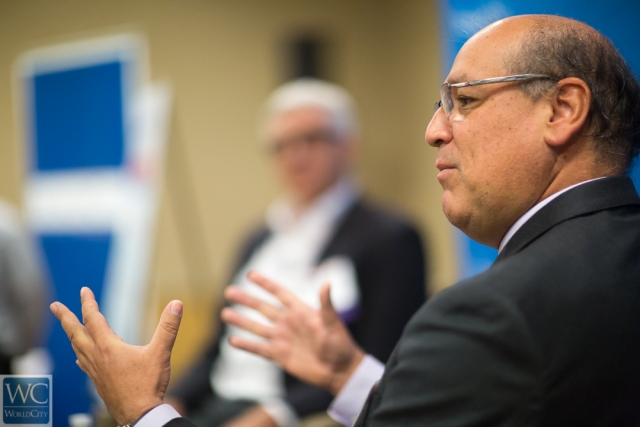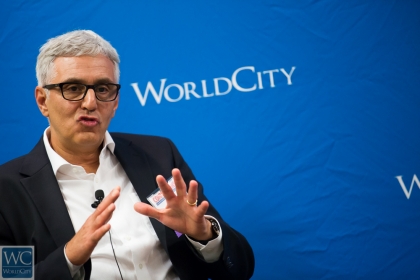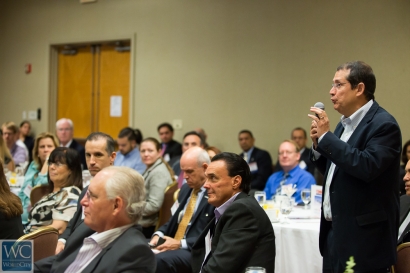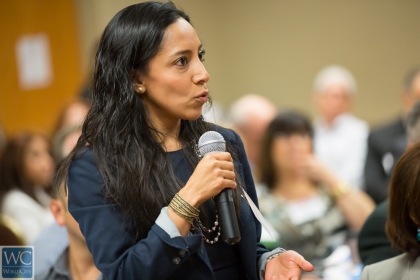Mastering Brazil, South Florida’s top trade partner

Brazil ranks as Florida’s No. 1 trade partner, but doing business with the South American giant still presents challenges from legendary bureaucracy to pockets of deep poverty and sky-high costs in some areas.
Ways to meet those challenges were discussed at WorldCity’s Trade Connections on June 20 with two panelists: Mauricio Ortiz (pictured above), vice president of the Americas for medical device maker Boston Scientific Corp., and Ivo Vieira Neto, chief executive of the U.S. unit of Brazil’s logistics company Nobel Cargo.
Among their tips: Buy a Brazilian company – or partner with one- who knows the local ropes.
South Florida: A net exporter to Brazil
WorldCity President Ken Roberts kicked off talks with some South Florida-Brazil trade numbers.
Brazil has been South Florida’s top trade partner for at least two decades. It’s the only country to ever have accounted for more than 10 percent of South Florida trade and has done so every year since 1995.

Ivo Vieira Neto, chief executive of the U.S. unit of Brazil’s logistics company Nobel Cargo. Photos by Carlos Miller
South Florida made up nearly one-quarter of the $71.6 billion in goods traded between the United States and Brazil in 2013, more than any other U.S. Customs district. Miami International Airport ranked as the top U.S. entry way for Brazilian sales into the United States, Roberts said.
But South Florida-Brazil is not evenly balanced. South Florida sells more to Brazil than it buys. South Florida sales range from cellphones to aircraft parts. Purchases include planes made by Brazilian aircraft maker Embraer and guns from Brazilian manufacturer Taurus International, said Roberts.
Coping with bureaucracy
For Boston Scientific, the outlook for sales in Brazil are bright. The nation has a large potential market: 200 million people and growing, including many who are aging and could use medical devices.
Yet many Brazilians still die for lack of preventive care and treatment, especially in the poor areas such as Brazil’s northeast where there simply are too few doctors to meet needs.
Boston Scientific’s business in Brazil “should be five tor six times what it is today” based on the country’s population, said Ortiz.
Meeting needs is complicated by the high cost of doing business, said Vieira Neto. Between traffic jams, hefty paperwork and regulations requiring a change in truck drivers every eight hours, it’s common to use two or three drivers just to move one shipping container. Those costs add up across the supply chain.
Indeed, Boston Scientific considered starting a Brazilian company to set up a factory, but “we realize with the bureaucracy in Brazil, it could take us five to six years to open,” said Ortiz.
The solution: It’s looking to buy a Brazilian firm with factory operations and expand them, Ortiz said.
Better economy, growing middle class
To be sure, things used to be worse. New airports have greatly improved logistics. Today, there are many more flights within Brazil and departing Miami to lots more Brazilian cities, said Vieira Neto. 
The middle class in Brazil also is growing at a fast clip, up by perhaps 40 million more people in the past 20 years. And when it comes to health care, that middle class is more aware of potential treatments and has insurance that can pay for more doctors and for more medical devices, said Ortiz.
Technology also holds promise to boost health care. Cellphones increasingly are being used for diagnostics, and one day, “people will go to hospitals only for surgery, nothing else,” said Ortiz.
Competing with Indian, Chinese companies
Attendees had ample questions, for example: How can U.S. companies compete when lower-cost producers like India and China increasingly are selling into Brazil?
Ortiz said Indian and Chinese companies often undercut U.S. producers by the way they enter the market: cheaply and informally.
“We are very formal in how we ask permission,” said Ortiz.

To win customers, Boston Scientific segments the market carefully and generally offers different items than it would in the United States – goods more geared to the mass-market or mid-tier buyer.
The company also aims to offer superior logistics, including tracking systems for products that can show, for example, exactly who inserted a thread into a stent if something goes wrong, said Ortiz.
Some audience members also asked about regional differences inside Brazil, a country the size of the continental US.
Brazil’s northeast is the least explored area for business, with the greatest opportunity and the most upfront investment required, said Ortiz.
Trade Connections is one of six event series organized by WorldCity to bring together executives in the greater Miami area on international business topics. The Trade series is sponsored by Miami International Airport, American Airlines Cargo and PortMiami.
The next Trade Connections is set for Aug. 22 on perishables trade.